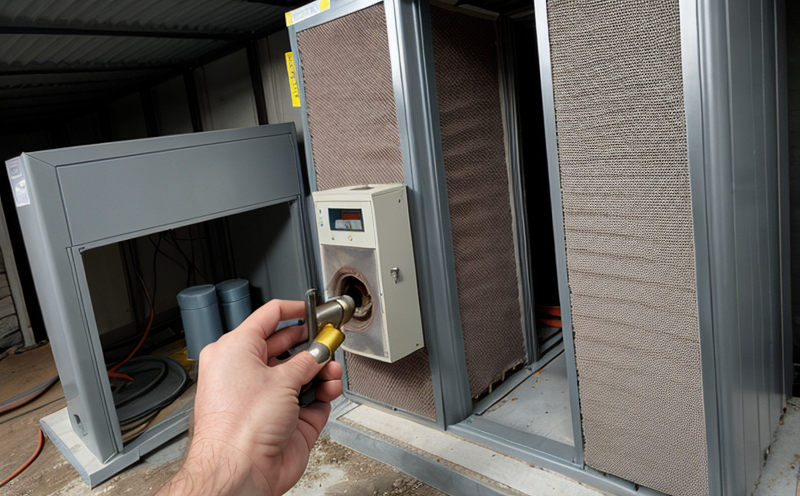ASTM D1519 Determination of insulating properties of fabrics
The ASTM D1519 standard test method is used to determine the insulating properties of woven, knitted, and non-woven fabrics. This test measures how well a fabric insulates against heat transfer by calculating its thermal resistance (R-value or R-factor). The procedure involves subjecting the fabric sample to a controlled temperature difference between two surfaces while measuring the heat flow through it.
This testing method is crucial in various sectors including textiles, apparel manufacturing, and home furnishing. It helps manufacturers ensure their products meet safety standards and consumer expectations regarding thermal comfort and energy efficiency. By providing accurate R-values, this test ensures that fabrics perform reliably under different environmental conditions.
The ASTM D1519 protocol specifies detailed procedures for preparing the specimen, setting up the apparatus, conducting measurements, and analyzing data. Specimens are typically cut from the fabric to standard dimensions and placed between two heated plates with controlled temperatures. The heat flow is measured over a specified period, usually 24 hours, using specialized equipment like calorimeters.
The results of this test provide valuable information for quality managers, compliance officers, R&D engineers, and procurement teams working in the textile industry. It aids them in selecting appropriate materials that balance insulation performance with other desirable properties such as breathability or durability. Additionally, it supports product development efforts by identifying potential improvements needed to meet market demands.
Understanding the insulating properties of fabrics is essential for ensuring products comply with relevant regulations and guidelines. For instance, some countries have specific requirements regarding energy efficiency in building materials, which often extend to textiles used within those structures.
- Customer Impact: Ensures customer satisfaction by delivering high-quality products that meet specified insulation standards.
- Safety Assurance: Protects users from excessive heat exposure or cold drafts.
- Energy Efficiency: Contributes to reducing overall energy consumption in buildings and homes.
In conclusion, ASTM D1519 plays a vital role in maintaining product quality and safety across multiple industries. Its rigorous testing process ensures that fabrics perform optimally under various conditions, leading to better user experiences and more sustainable practices.
Why Choose This Test
Selecting the appropriate test method is crucial when evaluating the insulating properties of fabrics. ASTM D1519 offers several advantages over other available methods:
- Precision: Provides highly accurate measurements of thermal resistance, which is essential for precise product development and quality assurance.
- Standardization: Ensures consistency in testing across different laboratories, making it easier to compare results internationally.
- Versatility: Suitable for a wide range of fabric types including woven fabrics, knits, and non-wovens, catering to diverse industry needs.
- Regulatory Compliance: Helps manufacturers ensure their products meet local and international standards related to thermal insulation performance.
The precision and reliability offered by ASTM D1519 make it an ideal choice for companies seeking comprehensive insights into the insulating capabilities of their fabrics. This test not only enhances product quality but also supports sustainable practices by promoting energy-efficient solutions.
Customer Impact and Satisfaction
The ASTM D1519 standard has a significant impact on customer satisfaction in the textile industry. By providing accurate measurements of thermal resistance, this test ensures that products perform reliably under different environmental conditions. This reliability translates directly into enhanced user experiences, contributing to higher levels of customer satisfaction.
- Enhanced Comfort: Products with optimal insulation properties offer greater comfort by maintaining comfortable temperatures inside homes or workplaces.
- Sustainability: The ability to achieve better thermal performance while reducing energy consumption promotes sustainable practices among consumers.
- Trust: Knowing that products meet rigorous international standards fosters trust between manufacturers and customers, leading to repeat business opportunities.
In summary, ASTM D1519 plays a crucial role in enhancing customer satisfaction by delivering high-quality, reliable products. This contributes positively to brand reputation and long-term relationships within the textile sector.
International Acceptance and Recognition
The ASTM D1519 standard is widely accepted and recognized internationally due to its strict adherence to scientific principles and rigorous testing procedures. This ensures that results obtained are consistent and reliable across different geographical locations.
Many countries have adopted this test method as part of their regulatory frameworks for thermal insulation performance in textiles. Organizations like the International Organization for Standardization (ISO) and ASTM itself emphasize the importance of such standards in promoting global trade and ensuring product quality.
The acceptance of ASTM D1519 extends beyond national boundaries, fostering collaboration between industries worldwide. This standard serves as a benchmark for manufacturers seeking to establish credibility and maintain competitive advantage in international markets.





